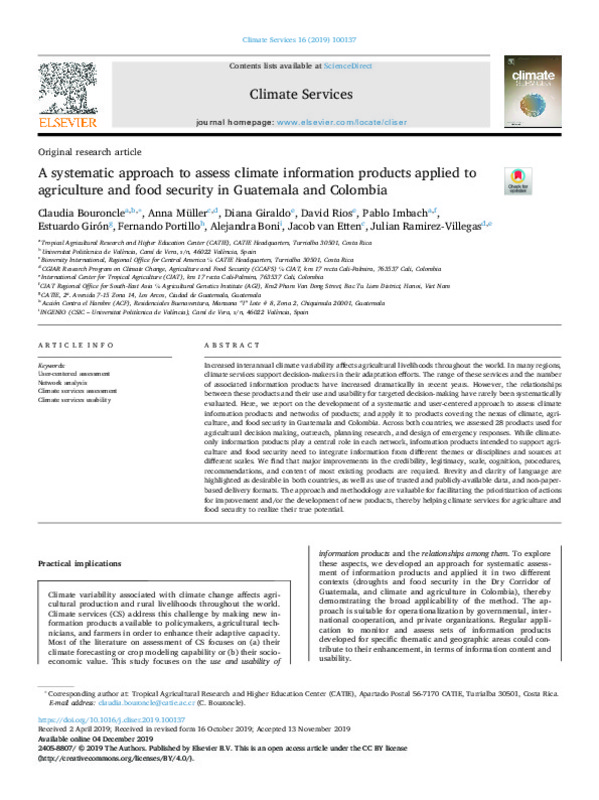JavaScript is disabled for your browser. Some features of this site may not work without it.
Buscar en RiuNet
Listar
Mi cuenta
Estadísticas
Ayuda RiuNet
Admin. UPV
A systematic approach to assess climate information products applied to agriculture and food security in Guatemala and Colombia
Mostrar el registro completo del ítem
Bouroncle-Seoane, C.; Müller, A.; Giraldo, D.; Rios, D.; Imbach, P.; Girón, E.; Portillo, F.... (2019). A systematic approach to assess climate information products applied to agriculture and food security in Guatemala and Colombia. Climate Services. 16:1-17. https://doi.org/10.1016/j.cliser.2019.100137
Por favor, use este identificador para citar o enlazar este ítem: http://hdl.handle.net/10251/155400
Ficheros en el ítem
Metadatos del ítem
| Título: | A systematic approach to assess climate information products applied to agriculture and food security in Guatemala and Colombia | |
| Autor: | Bouroncle-Seoane, Claudia Müller, Anna Giraldo, Diana Rios, David Imbach, Pablo Girón, Estuardo Portillo, Fernando van Etten, Jacob Ramirez-Villegas, Julian | |
| Entidad UPV: |
|
|
| Fecha difusión: |
|
|
| Resumen: |
[EN] Increased interannual climate variability affects agricultural livelihoods throughout the world. In many regions, climate services support decision-makers in their adaptation efforts. The range of these services and ...[+]
|
|
| Palabras clave: |
|
|
| Derechos de uso: | Reconocimiento (by) | |
| Fuente: |
|
|
| DOI: |
|
|
| Editorial: |
|
|
| Versión del editor: | https://doi.org/10.1016/j.cliser.2019.100137 | |
| Código del Proyecto: |
|
|
| Agradecimientos: |
We acknowledge support from the Climate Change, Agriculture and Food Security (CCAFS), under the project P42 Agroclimas 1 - Tailored agroclimatic and food security information for decision making in Latin America and P1604 ...[+]
|
|
| Tipo: |
|









